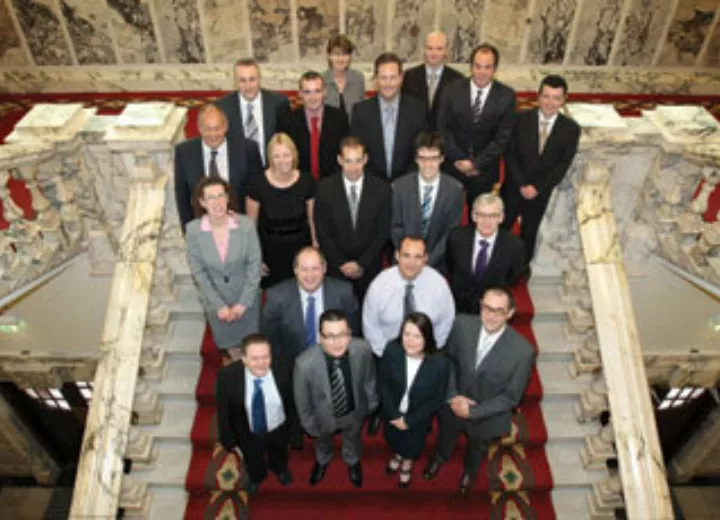How can an environmental management system structure deliver savings and embed learning across a range of organisations? Geraldine Boylan investigates.
Business survival in a period of economic downturn has been perhaps more of a focus than business improvement but with foresight to support and sustain the business community, Belfast City Council's Economic Initiatives and Waste Management sections made the decision to commit to funding the BITES (Business Improvement through Environmental Solutions) programme for a dozen local companies.
From January to September 2010, 12 local Belfast companies were recruited and participated in the BITES programme. Diversity is part of sustainability, and the range of sectors certainly reflected this - from construction and manufacturing through to professional services and social economy firms.
BITES is all about a hands-on learning experience; indeed engagement with adults learning in a ‘classroom' scenario can be a hurdle to overcome.
The programme is thus a combination of good practice site visits, guest speakers and interactive workshop sessions to maintain a fresh approach to learning.
Participants found this approach made learning more accessible and with the combination of one-to-one mentoring supporting the structure of the workshops, were able to see how the classroom learning was translated into action at their own premises.
In tandem with the BITES course, participants were also completing the building blocks of their own Environmental Management System (EMS). Outcomes of the programme saw each participant company at the equivalent of Phase 3 of BS 8555, more commonly known as IEMA's Acorn Approach to Environmental Management.
With their company's significant environmental aspects identified, companies then went on to develop appropriate environmental policies and created relevant and targeted environmental objectives.
During one-to-one follow-up with participants, consultants assisted with system implementation, both ‘organising' companies' records, documentation and work instructions such as emergency preparedness and response, and also giving solid, practical advice on how to reduce business costs.
Typical examples included:
-
understanding monitoring and measurement needs, and tracking data such as energy and water use, waste arisings, raw material usage and, critically, costs;
-
finding value in waste streams which could easily be segregated and sent for recycling; and
- reviewing transport fuel data and linking to business operations to identify inefficiencies in personnel-logistics in fleet.
BITES expanded the perspective of participants by providing a fresh look at their business operations. This had some interesting ‘spin-off benefits' within companies, for example:
-
tightening up document control systems and policies (one company was able to reduce the time spent searching for relevant documentation to respond to tenders by two-thirds!); and
- reducing risk through addressing failures in emergency response for hazardous substances (one company moved their emergency responder's breathing apparatus which was stored inside the enclosed area in which the hazardous substances could potentially leak into).
The scheme has not only delivered for participating companies, but the training and mentoring has also benefited the participants themselves. Confidence has grown with knowledge - but critically this has been facilitated through the one-to-one support.
With aspects of communication and training these days often passed to IT-based systems to manage, the human interface is a force to be reckoned with.
Allowing trainees to ask all manner of questions and to be nudged in the right direction has made a significant leap of understanding with participants and leading to real results.
At September's close-out Awards Ceremony in the Council Chambers, the hotly-contested ‘Most Improved' participant company award, was won by a delighted Tommy Harbinson, Building Services Manager from the Odyssey Arena.
BITES participants Edwards & Co receiving their certificate from Tim Walker and Shane Kelland of Belfast City Council
It is always a good sign of success when results are delivered whilst maintaining one's sense of humour. Tommy laughs that despite being tagged as the ‘Prince of Darkness' by his Security and Facilities team, he considers this a small price to pay as his involvement in BITES has delivered significant business improvement for the Odyssey!
"This is by far the best environmental course I have ever done by way of delivery, trainers, content and structure. aving the one-to-one follow up after the workshops has been the key to success - this really drives what I've learned and keeps the momentum going for me to act on the issues before my next site visit!"
Whilst Jackie Wilson from Extern, a social economy organisation, said: "The programme has helped towards reducing our carbon footprint and has identified real cost savings from waste and energy. It will also help our business turnover as having a mini-EMS will appeal to our funders' specifications when submitting tenders."
Following on from the programme's success, Belfast City Council plans to support a new round of BITES in January 2011, whilst maintaining contact with participants from 2010 in order to provide a forum to track continued savings and share good practice.
With a waiting list already in place, environmental management and IEMA's Foundation Certificate in the BITES programme looks set to become a solid part of business improvement programmes in Northern Ireland over the coming years.
Combined programme environmental and cost benefits included:
- Combined identified cost savings of £240,000
- Over 800MWh of energy savings identified (over gas and electricity)
- 35 tonnes of materials avoided (elimination in the waste hierarchy)
- 148 tonnes of waste diverted from landfill and re-routed to recycle
- 183 tonnes of landfill reduced
- 12 successful participants were awarded the IEMA Foundation Certificate in Environmental Management (UK)
- The savings as noted above were identified through:
- Energy-using building services equipment audits - covering heating, lighting and cooling (from heat recovery and controls through to simple switch-off campaigns)
- Water use reductions
- Material use reductions
- Implementation of monitoring and measurement systems to control resource usage and associated environmental impacts
- Diversion of waste from landfill through reduction and recycling
- Improved environmental awareness and communications










